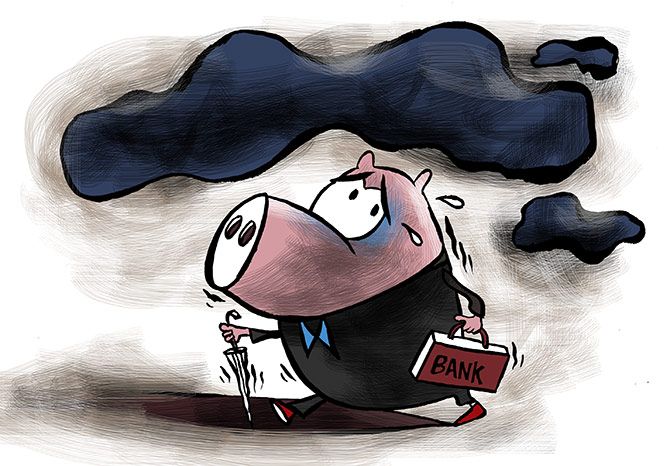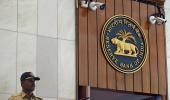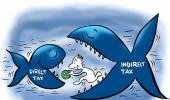S&P Global Ratings on Wednesday said Indian banks face a systemic risk as the second COVID wave will impair the performance of financial institutions in the April-September period.

Stating that economic recovery remains highly vulnerable to setbacks due to COVID, particularly if fresh outbreaks trigger new lockdowns, S&P said the banking sector's weak loans will likely remain elevated at 11-12 per cent of gross loans in the next 12 to 18 months.
"The second wave has front-ended weakness in asset quality," said S&P Global Ratings Credit Analyst Deepali Seth Chhabria.
"Financial institutions face a strained first half amid weak collections and poor disbursements."
Indian banks face systemic risk as the country sorts through the aftermath of the COVID second wave.
Lenders struggled with a high level of weak loans well before the pandemic struck and clearly, conditions have deteriorated, S&P said in a statement.
The government has announced support for the microfinance and tourism sectors that should help struggling borrowers.
This support comes on top of the recently extended loan guarantees to Small and Mid-size Enterprises (SMEs).
S&P said it expects the second wave to impair the performance of Indian financial institutions in the first half of fiscal year 2022, with much resting on the effectiveness of government measures to address this problem.
"A COVID resurgence involving new and potentially aggressive variants, and a vaccine rollout that undershoots our current expectations, remain the key downside risks.
"Limited vaccine supplies and people's reluctance to take doses have held back the country's inoculation programme.
"Fully vaccinating roughly 70 per cent of the country will likely take at least until the first half of 2022.
"This leaves the economic recovery highly vulnerable to COVID setbacks, particularly if fresh outbreaks trigger new lockdowns," S&P noted.
The US-based rating agency said the Indian economy has been in recovery mode since June, following a sharp contraction in the economic activity in April and May after localised lockdowns across much of the country.
The latest outbreak has less severely affected the country's manufacturing and exports than was seen during the first wave of infections, in 2020, but services continue to be disrupted.
"The current recovery should be less steep than the bounce that unfolded in late 2020 and early 2021. Households are running down savings.
"A desire to rebuild their cash holding may delay spending even as the economy reopens," S&P said, adding that it expects real GDP growth of 9.5 per cent in the current fiscal ending March 2022.
"Banks have much to digest in the quarter ahead. Disbursements slowed considerably in April and May.
"The credit that banks extended fell by about 1 per cent in the first two months of this fiscal year.
"The drop was largely seasonal -- there were similar declines in the same period for fiscals 2018 and 2019," it said.
S&P said tourism and recreation-related sectors, commercial real estate, and unsecured retail loans may contribute to higher Non Performing Loans (NPLs).
However, the banking system's exposure to many of these segments is moderate, and should have only a limited effect.
Housing finance (excluding affordable housing) and gold loans will likely be less affected compared with financing for micro enterprises or commercial vehicles.
The finance companies will likely be more impacted than banks, it added.
The government has come out with ambitious measures.
The initiatives include the state's emergency credit guarantee scheme, which bolsters the working capital of SMEs.
The government recently added Rs 1.5 lakh crore to its ECLGS (Emergency Credit Line Guarantee Scheme).
This comes on top of its existing programme of Rs 3 lakh crore extended to SMEs and the partial guarantee scheme for the finance companies.
The measures collectively should alleviate stresses to the country's banking system.
The government has also announced a Rs 7,500 crore-credit guarantee scheme for banks' new lending to microfinance borrowers through microfinance institutions.
The government will guarantee up to 75 per cent per cent of such loans.
"Though the plan will add liquidity, some of the affected borrowers may struggle to repay their accumulating debt.
"This along with a second restructuring scheme to address disruptions caused by the second COVID wave should push back banks' NPL recognition.
"The volume of restructured loans will likely rise," S&P said.
S&P Global Ratings credit analyst Geeta Chugh said the next six months should be defined by the effectiveness of policies to contain long simmering bank-sector strains, with much potential for COVID-related flare-ups.










